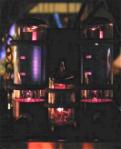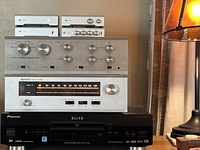Having had Bobs ST-70 for a while now I have experimented quite a bit with different 12at7's. I started out with the stock JJs that came with the amp. The sounded kinda thin to me. I then bought some NOS military Mullards from the 80s which were being sold at some tube outlets. Nice sounding tubes. Maybe not as defined as I had hoped. Then I got for free with some other tubes I purchased some 60s GE 6201s. They were ok but nothing special. I also got a set of Sylvania Black Plate 12at7wa's from the early 60s and they were some decent tubes. Very clear sounding tubes. I also got some Knight branded Mullards from the early 60s. They are nice but have that very tubey Mullard sound too. I got some Valvos recently from a guy in Germany. I had them in all three positions and they sounded kinda boomy but still nice. What I did is replace the middle tube, the voltage amp) with a 60s Knight Mullard and left the Valvos in the left and right positions and I think I have finally hit on a winner.
+4
Bugs
Tube Nube
Bob Latino
rwferr
8 posters
VTA Board Tube Rolling

Bob Latino- Admin
- Posts : 3276
Join date : 2008-11-26
Location : Massachusetts
- Post n°2
 Re: VTA Board Tube Rolling
Re: VTA Board Tube Rolling
Hi Richard,
That is good to know ... Thanks for your input on the 12AT7's. I also experiment with those 12AT7's and also some various output tubes in both the VTA ST-70 and VTA ST-120.
You are correct in that that middle 12AT7 on the VTA driver board which is the initial voltage amplifier for BOTH channels is probably the tube that has the most influence on the character of sound of the amp. Both the VTA board driven ST-70 and ST-120 respond well to tube choice. I still play around now and then with various types of tubes. I now have a NOS Telefunken 12AT7 in the center position and two Mullard CV4024's (12AT7 equivalent tube) in the two side phase splitter positions.
For those that have VTA board driven amps > An inexpensive tube that is very durable and sounds pretty good in all postions is the JAN Philips 12AT7WC. These are plentiful and inexpensive and make a good backup 12AT7 for your Mullard, Telefunken, Valvo etc. main 12AT7 tubes. "JAN" by the way, means "Joint Army Navy". These tubes were made by Philips for the US military in the 1980's and had to pass rigorous military tests. Since they are plentiful, they are not that expensive. Maybe $10 a tube. I got a lot of 100 tubes that is marked "2/88" and every tube in the lot (so far..) is very quiet and both triode sections match up fairly well.
Bob
That is good to know ... Thanks for your input on the 12AT7's. I also experiment with those 12AT7's and also some various output tubes in both the VTA ST-70 and VTA ST-120.
You are correct in that that middle 12AT7 on the VTA driver board which is the initial voltage amplifier for BOTH channels is probably the tube that has the most influence on the character of sound of the amp. Both the VTA board driven ST-70 and ST-120 respond well to tube choice. I still play around now and then with various types of tubes. I now have a NOS Telefunken 12AT7 in the center position and two Mullard CV4024's (12AT7 equivalent tube) in the two side phase splitter positions.
For those that have VTA board driven amps > An inexpensive tube that is very durable and sounds pretty good in all postions is the JAN Philips 12AT7WC. These are plentiful and inexpensive and make a good backup 12AT7 for your Mullard, Telefunken, Valvo etc. main 12AT7 tubes. "JAN" by the way, means "Joint Army Navy". These tubes were made by Philips for the US military in the 1980's and had to pass rigorous military tests. Since they are plentiful, they are not that expensive. Maybe $10 a tube. I got a lot of 100 tubes that is marked "2/88" and every tube in the lot (so far..) is very quiet and both triode sections match up fairly well.
Bob

Tube Nube- Posts : 707
Join date : 2008-12-06
Age : 61
Location : Calgary, AB
- Post n°3
 Re: VTA Board Tube Rolling
Re: VTA Board Tube Rolling
Looks like the JAN tubes are what came with my kit, Bob.
Saved me from ordering a set from you.
Don't hesitate, by the way, to let us... or me know when you have another combination to recommend trying out.
-Brenton
Saved me from ordering a set from you.
Don't hesitate, by the way, to let us... or me know when you have another combination to recommend trying out.
-Brenton

Bugs- Posts : 90
Join date : 2009-04-17
- Post n°4
 Re: VTA Board Tube Rolling
Re: VTA Board Tube Rolling
Any recomendation on the center tube if you are using the VTA low gain board with 12AU7s?Thanks,
Bugs
Bugs

Brinkman- Posts : 14
Join date : 2009-01-01
- Post n°5
 Re: VTA Board Tube Rolling
Re: VTA Board Tube Rolling
NOS RCA 12BH7. Better yet, get three and roll a trio. I preferred them to NOS Amperex 12AU7s in back-to-back comparisons.
BTW, I was also using the SDS power supply upgrade kit and a solid-state rectifier. Both are also recommended.
BTW, I was also using the SDS power supply upgrade kit and a solid-state rectifier. Both are also recommended.

Tube Nube- Posts : 707
Join date : 2008-12-06
Age : 61
Location : Calgary, AB
- Post n°6
 Re: VTA Board Tube Rolling
Re: VTA Board Tube Rolling
"Solid State"...?
What kinda modern-era trash talkin' blashemy is that?

What kinda modern-era trash talkin' blashemy is that?

Bob Latino- Admin
- Posts : 3276
Join date : 2008-11-26
Location : Massachusetts
- Post n°7
 Re: VTA Board Tube Rolling
Re: VTA Board Tube Rolling
It's not really blasphemy to use a solid state RECTIFIER. Dynaco did use them 40+ years ago in their ST-35 power amplifier and the SCA-35 integrated amplifiers. A solid state rectifier will provide a higher B+ voltage in an amp than any tube rectifier and won't "sag" the B+ voltage as much as a tube rectifier at higher current demands. You can get solid state rectifiers for your ST-70, Mark II, Mark III and Mark IV amplifiers that plug right into the tube rectifiers tube socket. They are relatively inexpensive and the ones I have used have worked well. The Weber WZ68 Copper Cap is a solid state rectifier that may be used in any Dynaco tube amp with an octal socket. If you do replace your tube rectifier with a solid state rectifier remember to rebias the amp because the use of a solid state rectifier will cause your bias to be too high with the settings that you used for the tube rectifier.
Bob
Bob

danf- Posts : 58
Join date : 2009-01-19
I would be really cautious replacing the tube rectifiers in Mark II and Mark III's if you are using any can capacitor and an original power transformer. Scott was getting 525V with a tube rectifier, a stock transformer, and a 120V AC supply. This is already edgy even with a 550V filter capacitor. I sure wouldn't want to add 30-40V more with a solid state rectifier. Some of the add-on power supply boards have a 630V or higher rating and would be a requirement in my view.
I do like the sound of a modern power supply, but it comes with some new issues.
I do like the sound of a modern power supply, but it comes with some new issues.

Brinkman- Posts : 14
Join date : 2009-01-01
- Post n°9
 Re: VTA Board Tube Rolling
Re: VTA Board Tube Rolling
Tube Nube wrote:"Solid State"...?
What kinda modern-era trash talkin' blashemy is that?
When I was running the stock board the Weber Copper Cap was a definite improvement. The amp certainly sounded less "winded". Adding the SDS power supply upgrade raised the bar even further, giving it a bit more low-end sustain and less audible sag.
When I improved the driver, the differences between the SS and tube rectification became less apparent and I often found myself alternating between the two trying to see if I had a true preference anymore. The differences at this point were similar to the Triode vs. Ultralinear subtleties.
The K&K Audio board I now use has a switch mode power supply (totally solid state) but uses the tube rectifier as a "soft-start". The influence of an absolutely unflappable power supply is shocking. It's really outstanding to hear these ST-70 output transformers maintain their poise when used in conjunction with such a modern design.
The VTA driver has a different, more diplomatic presentation and is a lot more affordable than the K&K audio driver. I wound encourage builders of ST-70s to start with a VTA driver in mind. An ST-70 with the VTA driver is quite possibly the best tube amp deal out there.

Listens2tubes- Posts : 15
Join date : 2009-04-08
Location : New Jersey
- Post n°10
 Re: VTA Board Tube Rolling
Re: VTA Board Tube Rolling
Hmm, I use the Webber WZ34's in my Mk IV amps with the stock 525 volt quad caps, the left an original. I have just changed those quads to the 80-40-30-20 550V version. Does the WX68 offer better characteristics in my application?
Oh, back on topic: I also found the JJ 12at7 tubes to sound thin in my Audio by Van Alstine Trancsendence Eight preamp. Next I tried RCA black plates which were much more listenable. Then I lucked into a pair of Telefunken ECC801s which help the preamp disappear.
which help the preamp disappear.
You know with the preamp gone and the speakers disappearing it's amazing there's any sound at all.
Oh, back on topic: I also found the JJ 12at7 tubes to sound thin in my Audio by Van Alstine Trancsendence Eight preamp. Next I tried RCA black plates which were much more listenable. Then I lucked into a pair of Telefunken ECC801s
You know with the preamp gone and the speakers disappearing it's amazing there's any sound at all.

quadaptor- Posts : 60
Join date : 2009-05-04
- Post n°11
 12AU7s and the VTA70 Board
12AU7s and the VTA70 Board
I discovered a couple of older private labeled Daystrom Mullard 12AU7s in some old Heathkit equipment I had kicking around. I plugged them into the outboard sockets of my VTA70 board with a JJ 12AU7 in the center socket. It made a difference in sound, especially on the bass end. I guess I'd have to say that the bass became more transparent if not a lot less boomy. Right now I have one of the Mullards plugged into the middle socket with two RCA clear top 12AU7s running in the outboard sockets and I find the sound very pleasing. I’m not a real fan of systems that generate boomy and unclear bass responses so that may tip you off to my listening preferences.
